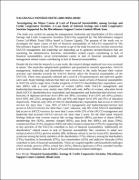| dc.description.abstract | NALUBANGA WINFRED IRENE (2009-M092-20030)
Investigating the Major Causes of Lack of Financial Sustainability among Savings and Credit Cooperative Societies: A Case Study of Selected Savings and Credit Cooperative Societies Supported by the Microfinance Support Centre Limited-Mbale Zone.
The study was carried out among the management, leadership and shareholders of five selected Savings and Credit Cooperative Societies (SACCOs) supported by The Microfinance Support Centre Ltd-Mbale Zonal Office based in Eastern Uganda. The purpose of the study was to investigate the major causes of lack of financial sustainability of SACCOs supported by The Microfinance Support Centre Ltd. The content scope of the study focused on; revenue sources that SACCO management and leadership are depending on to generate incomes/finances that are sustaining the administrative functions, shareholders related causes contributing to lack of financial sustainability, social environmental causes to lack of financial sustainability and management related causes contributing to lack of financial sustainability.
Despite the fact that the research is a case study, the research design employed was cross sectional in nature. The researcher adopted both qualitative and quantitative research approaches. SACCO management, leadership and shareholders were involved in the study because their routine activities and attitudes towards the SACCO directly affect the financial sustainability of the SACCOs. These were purposely selected and a total of 210 questionnaires and interview guides were used. Study findings indicate that there are various causes of lack of financial sustainability in SACCOs which range from; Gender (majority of SACCO shareholders/key respondents were men (60%) with a small proportion of women (40%) while SACCO management and leadership/interviewees were mainly men (56%) with only (44%) of women; education levels (both SACCO shareholders/key respondents and management and leadership/interviewees) were basically of diploma/certificate level (40% and 38%), secondary level (32% and 26%), primary level (18% and 22%), postgraduate (6% and 8%) and degree level (4% and 6%) of education respectively. Whereas only 54% of SACCO shareholders/key respondents had access to SACCO services for more than 1 year, 90% of SACCO management and leadership/interviewees had access to SACCO services for more than 1 year. Likewise, only 8% of the SACCO shareholders had access to SACCO services for more than 5 years while 52% of the SACCO management and leadership had accessed SACCO services for more than 5 years. On the other hand, research findings indicate that revenue sources like savings deposits (98%), purchase of shares (94%), membership fees (92%), interests charged (85%), pass book fees (68%), soft loans (59%), commission/fines (51%), donations (44%) and other business enterprises (33%) for supporting day to day activities of the SACCOs contribute to lack of financial sustainability. Additionally are shareholders‟ related causes to lack of financial sustainability like; resistance to adopt new technical advice (91%), poverty mindset (89), deliberate refusal to service loans (81), dependency syndrome among the family members of the shareholders (77%), illiteracy among the shareholders (73%), hostilities in households (67%), lazy shareholders (63%) and addictive lifestyles (54%) contribute to lack of financial sustainability. These are coupled together with household challenges which include; poverty (20%), school fees (16%), illiteracy/ignorance (14%), extended families (14%) (many children), lack of food (12%) and behavioural related challenges.
Key Words: Financial Sustainability, Savings & Credit Cooperative Societies, Microfinance Support Centre Limited, Mbale Zone | en_US |


